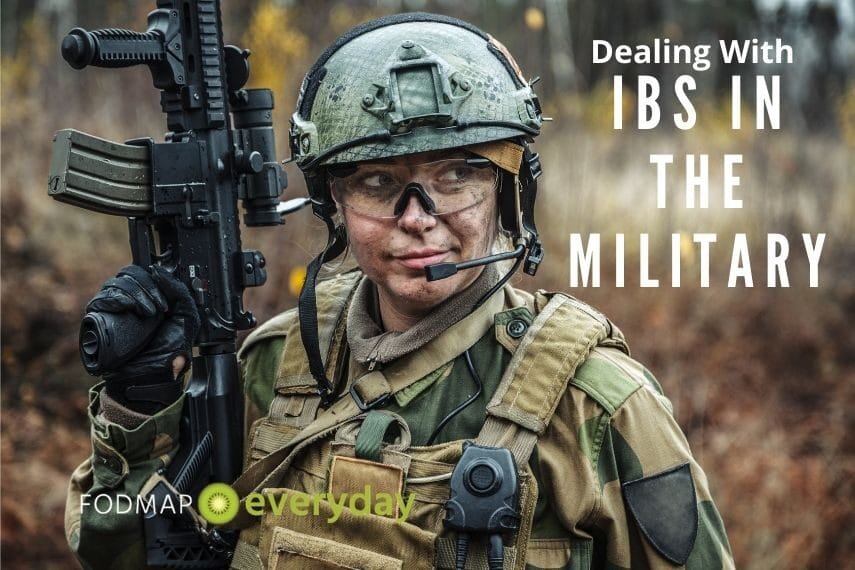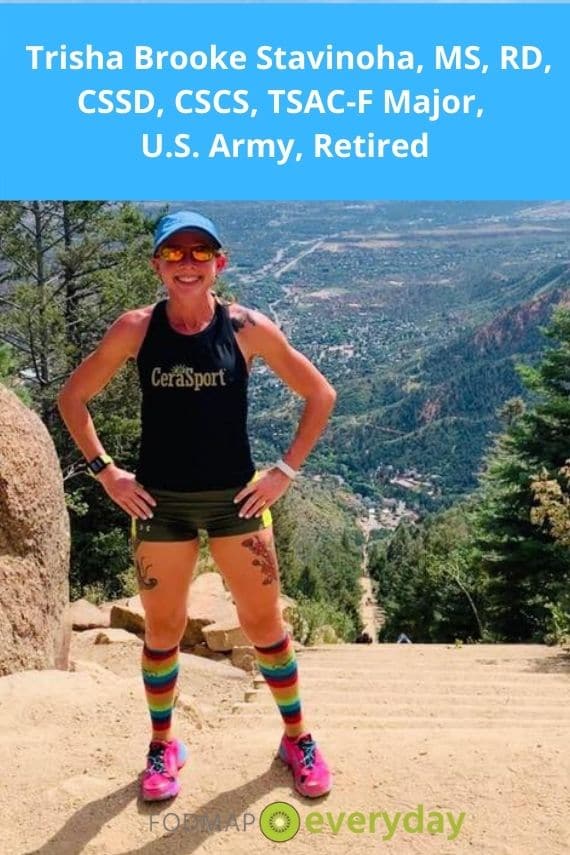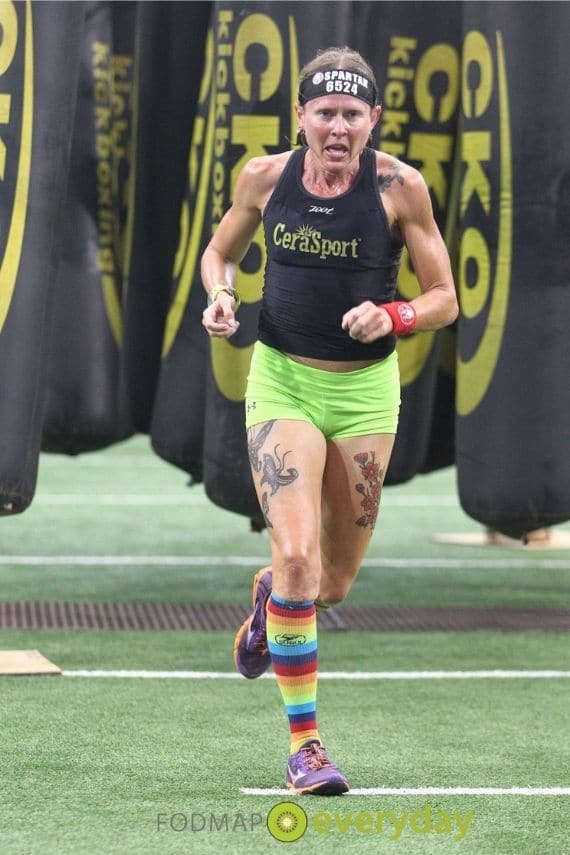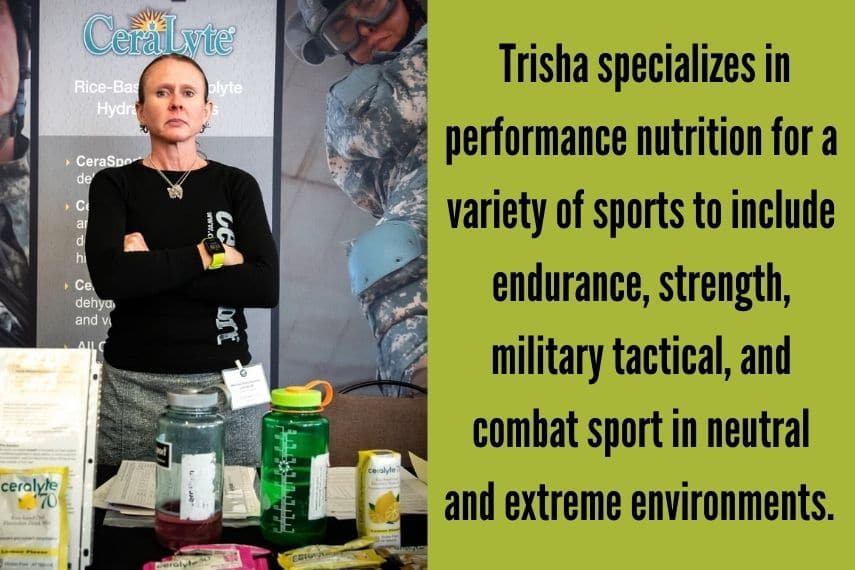Everyday life with IBS is challenging even when you have full control over your environment and stressors.
Now imagine yourself dealing with IBS in the military. You have no control over what you get to eat. You have no control over where you are going, or for how long, and what you will find when you get there.
You can also find yourself with exercise induced IBS. Where the stresses on your body created by physical exertion, body movement and exhaustion can cause IBS symptoms to appear or flare.
One thing you can count on while serving in the military is your body and mind will be stressed to it’s limits, sometimes repeatedly.

- Meet Trisha
- Trisha's Story of Dealing With IBS In The Military
- Determine What Kind Of IBS You Have
- Learning What Works When You Are Dealing With IBS In The Military
- Recap: What You Can Do If You Suffer From IBS While In The Military
- Veteran Benefits and Support For Service Related IBS
- The Takeaway
- Stress & IBS
- About Trisha
Meet Trisha
This is exactly where the dietitian author of this article, Trisha Brooke Stavinoha, MS, RD, CSSD, CSCS, TSAC-F Major, U.S. Army, Retired, found herself.
Her story of a dramatic IBS attack during a military training is grim, and likely shared by more service members than we hear or know about.
And perhaps a story that should be told more often in an effort to bring some needed awareness and change to how the military ensures all of it’s members have the right nutritional and physical support to be at their best.

We first met Trisha because of her relationship with, and support of, Cera hydration products, some of which are lab tested and certified low FODMAP by Monash University and are now included in the priority procurement catalog for the department of defense! You can read her bio at the end of this article.
Take a read and if you can relate to her story of dealing with IBS in the military let us know in the comments below.
Trisha’s Story of Dealing With IBS In The Military
I never really ran much until I decided to join the Army back in 1998. I learned we had to do a 2-mile run for the Army Physical Fitness Test (APFT), so my last year of college I started to run. I did not run far, maybe 1-2 miles. I honestly don’t remember. The only thing I remember about my runs in my early days was my “runs.”
I hated running with a group because I feared needing to make a b-line for the bushes. In officer basic course we had to run in ability groups. I remember being good enough to run in the fast group but also remember having stomach issues.

I became very comfortable with making good use of bushes, which is a good skill in the Military! I never ate or drank before running because I did not want to aggravate my stomach. Non-running dietitians would criticize me because I refused to eat before running. I was just trying to control my tummy.
Running with the Runs: Arrested!
Ft. Gordon, Georgia was my first assignment. I decided to go for a run one Saturday morning while doing laundry on post. I put my clothes in the washer at the post laundromat and headed out for a run. Sure enough, I needed to find a place to “stop.” This was urgent.
I was in a neighborhood. I saw a tree. I claimed that tree and moved on. Less than 5 minutes later as I was running back to the laundromat, a MP or military police officer stopped me. Apparently, someone called the MPs on me and I was literally handcuffed and taken to the MP station. I was charged with indecent exposure, conduct unbecoming of an officer and public defecation.

They called my troop commander, a Lieutenant Colonel (LTC) to come get me out. Normally they would call my company commander, a Captain, but they were out of town. I was so embarrassed.
I was a 1st Lieutenant (1LT) at the time. Typically, a 1LT does not meet their Troop Commander unless they do something really good or are in trouble. For non-military folks, this would be like upper management coming to pick up one of their front-line workers whom they have never seen before.
An IBS Diagnosis Helped
Fortunately, I worked in a hospital and was friends with a physician who understood my condition. I was able to get IBS (irritable bowel syndrome) documented in my medical record and all “charges” were dropped.
This makes for a funny story now, but this really could have been the end of my military career. My boss at the time, also a LTC, was understanding. She and I are great friends, and we laugh about it.
Ft. Polk, Louisiana was my second assignment. I had an “issue” while taking my APFT. We ran the test on a 1-mile track. Fortunately, I am fast and the back half of the track is through a forest and has huge trees on both sides. I like to brag that I stopped to poop and still ran it under 13 minutes.
Fear Comes Into Play
I avoided running in races longer than 10 miles because I was afraid to eat or drink anything during. I decided to push through it and did a couple half marathons.
My symptoms got worse, bloody worse. After some concerns it might be more than IBS, I reached out to a friend of mine who happened to be a gastro doctor at Brook Army Medical Center.
Get Medical help
I ended up getting my first colonoscopy at the age of 29. Normally you don’t get one of those until you are 50. My test was clear.
Fortunately, being a sports dietitian, I educated myself on how to train my gut to tolerate fueling during my run. I also learned about products that were gentler on the stomach due to the type of carbohydrate used. I had no idea about this before and they did not teach this during my nutrition training.
You May Want to Read: How To Fuel When You Have IBS: All About Low FODMAP Sport Gels, Sport Drinks & Snacks
Determine What Kind Of IBS You Have
First determine with the help of a doctor or dietitian if your IBS symptoms are stress induced or exercise induced. Stress from training, unpredictable schedules, short staffing, difficult field environment and subsequent poor sanitation, fear, fatigue, stress from graduating or passing to the next phase of training are legitimate examples of stressors that could trigger IBS. So be sure to get a clear diagnosis of what is causing your IBS symptoms – so you can focus your approach to mitigating the symptoms and the impact on your life.
Learning What Works When You Are Dealing With IBS In The Military
During endurance training we rely on carbohydrates for energy and fuel to support the training. We get this from sport drinks and sport foods like gels and chomps. Most products use simple sugar because it is cheap and sweet. Simple sugar sources include sugar, cane sugar, dextrose, sucrose, organic sugar, fructose, high fructose corn syrup, and maltose. Despite all the names, they are all sugar.
Sugar has a high osmolality. Osmolality refers to the number of particles in a solution. More particles take longer to leave the stomach. The result is bloating and cramping. High osmolality also pulls fluid from the blood into the small intestine. This can result in extra “pit stops.”
You May Want To Read: IBS-D: Irritable Bowel Syndrome with Diarrhea
Fueling For Endurance Training When You Have IBS
During endurance training, a few things happen to our GI system. First, gastric emptying is slowed. This means it takes longer for normal fluid to leave your stomach. So, you can see how this would be compounded with simple sugars having a high osmolality.
Second, blood flow is redirected from the small intestine to fueling your muscles and cooling you down. Absorption of nutrients and fluids is consequently decreased. Fluids with a low osmolality are absorbed much faster in these intestinal conditions.
There are products that use complex carbohydrates instead of sugar. Complex carbohydrates have fewer particles and subsequently a low osmolality. They leave the stomach quickly and are absorbed into the bloodstream from the small intestine much faster than fluids with simple sugars. Complex carbohydrates used in sport drinks include rice, maltodextrin and corn. These products are not as widespread.
Try Low FODMAP Certified Cera Products
Manufacturing a quality product using a complex carbohydrate is not as easy as using sugar and complex carbohydrates are more expensive so manufacturers don’t have as high of a profit margin.
Cera Products is an example of a manufacturer who uses rice. They have spent 25 years perfecting the formula. Rice is of particular benefit to athletes with exercise induced IBS or other GI issues because it is gluten free and low in FODMAPs.
FODMAPs are carbohydrates that ferment in the colon of some people and cause gas, bloating, and diarrhea. Fructose, a sugar used in a lot of sport drinks, is a FODMAP source. Merely the high osmolality of simple sugar and the amount needed during endurance training will make it intolerable to people with IBS or will induce IBS in “normal” people.
Buy Cera Products from Amazon US or AU
Gaining Control: Managing IBS & Running Success
After I gained control of my gastrointestinal system, I ended up running All Army Cross Country and All Army Triathlon. I competed in over 16 Army 10-milers, 4 Bataan Death March marathons and countless other endurance events requiring fuel before and during.
I have had zero future encounters with the MPs. Sure, I still make the occasional “pit stop” when I run. This is normal, but it no longer disables my running.

Time For The Military To Do Better For Soldiers Dealing With IBS
Unfortunately, 99% of the military does not get the nutrition training I did. I am certain they are not comfortable bringing up tummy issues to their training NCO or drill instructor, who is probably not the expert in exercised induced IBS anyway, which is exactly what I had.
Most service members don’t even know they have a dietitian they can turn to until they are told they are overweight so they are certainly not aware they can go to a dietitian to help them learn how to fuel during PT to control IBS.
The low FODMAP diet is still very unfamiliar to most people in the military. The individuals that purchase hydration solutions for troops don’t realize the same ingredients that make a product cheap and sweet are the ingredients that cause gas, bloating and inconvenient pit stops. And in many cases are high in FODMAPs.
To help the military make healthier hydration choices, Cera Products was just put on the Ability One priority procurement catalog. While it is a requirement for 100% of the Department of Defense to choose Cera Products first, I like to say “Now they have to buy the best.”
We don’t track how many troops have stress related IBS or exercise induced IBS, but the line to the portable-potties before and during a APFT or how many go on “sick call” for stomach issues right before PT could be a good indicator.
Recap: What You Can Do If You Suffer From IBS While In The Military
- Don’t pretend you don’t have a problem. Address it. It won’t go away on it’s own. This article may help you learn how to discuss it.
- Educate yourself on your military rights and benefits as regards to any Functional Gastrointestinal Disorder such as IBS. This article by the International Foundation for Gastrointestinal Disorders (IFFGD) provides excellent guidance and resources. If you are a Gulf War Veteran you may have special benefits as there is a presumption of service connection between IBS and service in this theater.
- Discuss it with your doctor and make sure it is noted on your medical records.
- Speak with a military dietitian. Every installation with a MTF (medical treatment facility) has one.
- Educate yourself about the mechanisms of IBS and general practices for mitigating symptoms.
- Download the Monash app and learn which foods may trigger symptoms. Better yet, consider taking the Monash Course on the Low FODMAP Diet for Patients. It’s inexpensive, you can try it for free and will help you be successful at managing your IBS.
- Download the Nerva app – and determine if gut-directed hypnotherapy works for you.
- Download this card and this card to help you communicate your food restrictions in situations you are able to advocate for yourself.
- Use only low FODMAP hydration and nutritional supplements where possible.
Veteran Benefits and Support For Service Related IBS
If you suspect your IBS is a result of your military service, you should consult with your local Veterans Health Administration benefits counselor during separation or retirement.
The Takeaway
There is a solution: education and Cerasport®. We need to educate those who are in charge of buying hydration solutions for military training what qualities they should look for to maximize the health of the force.
Cerasport is the only sports drink available to the military that is low FODMAP, has zero added sugar, zero fructose, has an osmolality under 160 mOsm/L and is gluten free. All these factors make it tolerable by almost anyone with any food allergy or intolerance.
With approximately 1.3 million active duty members, at least 10-15% or about 130,000-200,000 will have IBS with many more suffering from exercise induced IBS.
As of publication of this article Cerasport products are now included in the Ability One priority procurement catalog for the department of defense- which is a good start. Education and implementation of good IBS mitigation strategies are still needed.
Do you or did you serve in the military and suffer from IBS while doing so? We’d love to hear about your experiences in the comments below.
Stress & IBS
Stress is often a co-factor with IBS. IBS can create stress, and stress can trigger IBS symptoms. If this is true for you, please check out our article on IBS & Stress.
About Trisha
(excerpted from Behind The Shield: Podcast Episode 306)

Trisha retired in 2018 after a 20-year career as an Army Dietitian, the last 12 years serving in a performance nutrition capacity. She earned her BS in Nutrition from Texas State University in 1998, then joined the Army through their dietetic internship program. She was selected to attend a Sports Nutrition Master’s program at Long Island University, graduating in 2006, then earned her CSSD and CSCS. Since retiring, she added lifeguard, masters swim instructor, and TSAC-F to her list of credentials.
Trisha was one of the first Army RDs to earn both her CSSD and CSCS and uses the knowledge as a competitive athlete and on competitive athletes. She specializes in performance nutrition for a variety of sports to include endurance, strength, military tactical, and combat sport in neutral and extreme environments. She has been on 10 All Army Sport teams and was a walk on for the cross country and track teams during graduate school. She coached and trained with the installation Army 10-miler team and Bataan Death March teams.
Trisha developed the performance nutrition service for the Center for the Intrepid, the military’s premier rehabilitation center for our wounded tactical athletes and advises the local adaptive sports program. She had the grand opportunity to work with the Army’s esteemed World Class Athlete Program, helping combat sport and track athletes reach their fullest potential to qualify for a spot on the Olympic team.
Trisha currently works as a nutrition consultant for Cera Products, Inc., a rice-based hydration manufacturer specializing in products for individuals with unique hydration conditions. This affords her the opportunity to work with a variety of clients to include firefighters. She continues to work with the military, educating on executing a proper hydration plan based on the environmental conditions and workload. She closely follows two principals. 1) Hydration for tomorrow occurs today; hydration for today occurred yesterday. 2) A sports drink alone will not prevent dehydration and athletes must first address baseline hydration with food and water.












